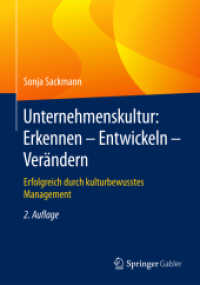- ホーム
- > 洋書
- > 英文書
- > History / World
Full Description
The first English translation of letters of arrest from eighteenth century France held in the archives of the Bastille
Drunken and debauched husbands; libertine wives; vagabonding children. These and many more are the subjects of requests for confinement written to the king of France in the eighteenth century. These letters of arrest (lettres de cachet) from France's Ancien RÉgime were often associated with excessive royal power and seen as a way for the king to imprison political opponents. In Disorderly Families, first published in French in 1982, Arlette Farge and Michel Foucault collect ninety-four letters from ordinary families who, with the help of hired scribes, submitted complaints to the king to intervene and resolve their family disputes.
Gathered together, these letters show something other than the exercise of arbitrary royal power, and offer unusual insight into the infamies of daily life. From these letters come stories of divorce and marital conflict, sexual waywardness, reckless extravagance, and abandonment. The letters evoke a fluid social space in which life in the home and on the street was regulated by the rhythms of relations between husbands and wives, or parents and children. Most impressively, these letters outline how ordinary people seized the mechanisms of power to address the king and make demands in the name of an emerging civil order.
Arlette Farge and Michel Foucault were fascinated by the letters' explosive qualities and by how they both illustrated and intervened in the workings of power and governmentality. Disorderly Families sheds light on Foucault's conception of political agency and his commitment to theorizing how ordinary lives come to be touched by power. This first English translation is complete with an introduction from the book's editor, Nancy Luxon, as well as notes that contextualize the original 1982 publication and eighteenth-century policing practices.
Contents
Contents
Translator's Preface
Editor's Introduction
Presentation
The King's Orders
At the Family's Request
1728-1758: A Survey
1. Marital Discord
Putting and End to One's Misery
The Pact Broken
Debauch: Masculine Spaces, Feminine Spaces
The Gaze of Others
The Imprisonment Obtained or the Beginning of a Story
Obscure "Police Clarifications"
The Singular Status of Repentance
Documents 1. Marital Discord
Households in Ruin
The Imprisonment of Wives
The Debauch of Husbands
The Tale of a Request
2. Parents and Children
Conflicts of Interest
Disturbance
"Conflicts at the Threshold"
Departure for the Islands
The Honor of Families
Parental Ethics
Documents 2. Parents and Children
The Disruption of Affairs
Shameful Concubinage
The Dishonor of Waywardness
Domestic Violence
Bad Apprentices
Exiles
Family Honor
The Parental Ethos of 1728: The Importance of Sentiment
The Parental Ethos of 1758: The Duty to Educate
3. When Addressing the King
From Use to Abuse
Representation and Secrecy
The End of Lettres de Cachet
Afterword
Arlette Farge
Notes
Index to Names
Index to Places








